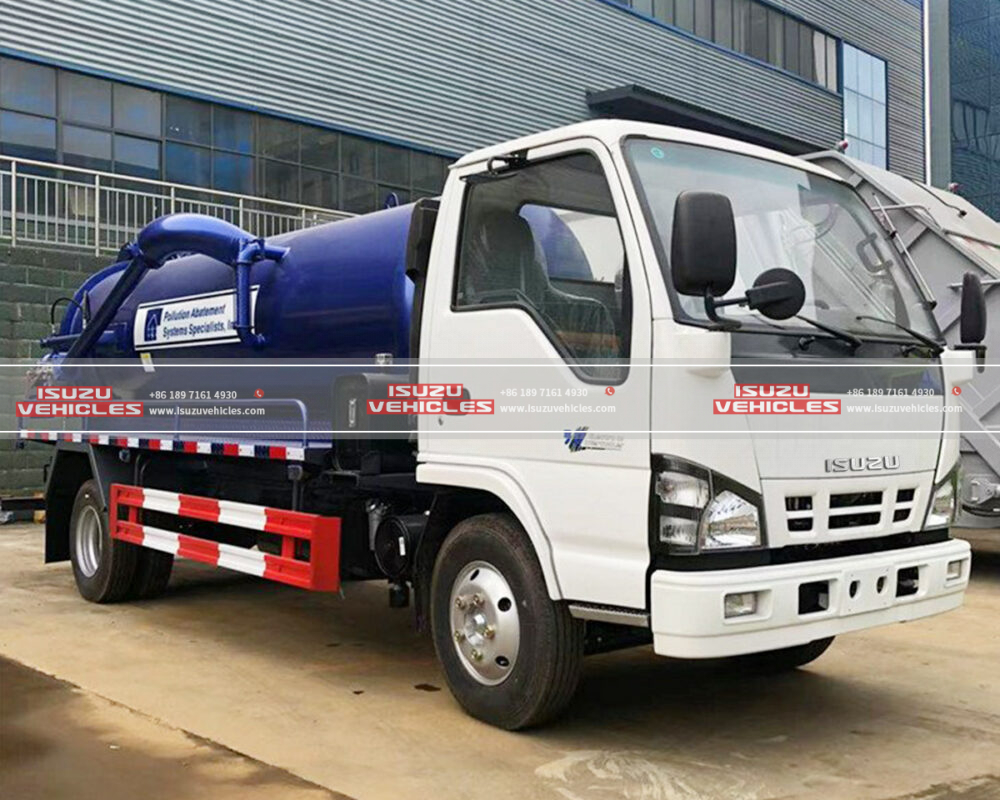Modern cities rely on robust sewer systems to maintain public health, environmental safety, and urban functionality. At the heart of these systems are specialized vehicles designed to manage waste, clear blockages, and ensure seamless operations. ISUZU sewer trucks stand out as indispensable tools in this critical infrastructure, combining durability, efficiency, and advanced engineering. This article explores how proper care and operation of these vehicles can prolong their lifespan, optimize performance, and keep communities clean.
The Critical Role of ISUZU Sewer Trucks in Modern Infrastructure
Sewer systems are the unsung heroes of urban living, silently managing wastewater, storm runoff, and debris. However, their efficiency depends heavily on the equipment used to maintain them. ISUZU sewer trucks are engineered to handle demanding tasks such as vacuuming sludge, hydro-jetting pipelines, and transporting hazardous materials. Their rugged chassis, powerful engines, and specialized attachments make them ideal for both routine maintenance and emergency interventions.
A well-maintained ISUZU fleet ensures municipalities and contractors can respond swiftly to blockages, overflows, or environmental hazards. Neglecting these vehicles, on the other hand, risks costly downtime, increased repair expenses, and potential public health crises. By prioritizing proactive care, operators can maximize the value of their investment while contributing to the longevity of the sewer infrastructure itself.
Routine Maintenance: The Lifeline of ISUZU Sewer Trucks
Preventive maintenance is the cornerstone of reliability for any heavy-duty vehicle, and ISUZU sewer trucks are no exception. These machines operate in harsh environments, exposing them to corrosive substances, abrasive materials, and constant vibrations. A structured maintenance regimen not only mitigates wear and tear but also identifies minor issues before they escalate into major failures.
Daily Checks: Ensuring Operational Readiness
Begin each day with a thorough inspection of the truck’s critical components. Check fluid levels—including hydraulic oil, coolant, and engine oil—to ensure they meet manufacturer specifications. Examine hoses, seals, and connectors for signs of leaks or cracks, which are common in vehicles handling high-pressure fluids. Test the vacuum pump, water jets, and control systems to verify they’re functioning optimally.
Monthly Inspections: Deep Dives for Long-Term Health
Schedule comprehensive inspections every 30 days or 1,000 operating hours, whichever comes first. Focus on the preventive maintenance of the chassis, suspension, and braking systems, as these bear the brunt of heavy loads and uneven terrain. Lubricate moving parts, such as the PTO (power take-off) unit and boom arms, to reduce friction. Replace air filters and inspect the exhaust system to maintain engine efficiency and comply with emission standards.
Best Practices for Operating ISUZU Waste and Sweeper Trucks
Efficient operation goes hand in hand with mechanical care. Even the most well-maintained ISUZU waste truck will underperform if operated improperly. Training drivers and technicians on best practices ensures safety, reduces operational costs, and extends vehicle lifespan.
Optimizing the ISUZU Waste Truck for Heavy-Duty Tasks
When handling solid waste or hazardous materials, avoid overloading the truck’s capacity. Exceeding weight limits strains the chassis, suspension, and hydraulic systems, leading to premature wear. Distribute loads evenly and secure containers to prevent shifting during transit. Utilize the truck’s onboard diagnostics system to monitor performance metrics in real time, such as engine temperature and hydraulic pressure.
Enhancing Efficiency with the ISUZU Sweeper Truck
For storm drain cleaning or street sweeping, the ISUZU sweeper truck relies on precise coordination between its brushes, vacuum systems, and water sprayers. Adjust brush pressure based on surface type—lower settings for delicate pavements and higher pressure for stubborn debris. Regularly clean the hopper and filters to maintain suction power, and avoid ingesting large objects that could jam the mechanism.
Addressing Common Challenges in Sewer System Management
Even with meticulous care, sewer trucks occasionally face operational challenges. Recognizing these issues early and applying targeted solutions minimizes disruptions.
Combating Corrosion and Chemical Damage
Sewer environments expose vehicles to corrosive substances like hydrogen sulfide, acids, and saltwater. To protect the ISUZU sewer truck’s body and components, apply anti-corrosion coatings to vulnerable areas such as the undercarriage and tank interiors. Rinse the vehicle thoroughly after each shift to remove residual chemicals.
Resolving Blockages in High-Pressure Systems
Clogged nozzles or weakened water jets reduce the effectiveness of hydro-jetting equipment. Inspect the high-pressure water jets weekly for mineral buildup or cracks. Use filtered water to prevent sediment from entering the system, and flush the lines after each use. If pressure drops persist, check the pump’s valves and seals for wear.
The Future of Sewer Maintenance: Technology and ISUZU Innovations
The sewer management industry is evolving rapidly, driven by automation, data analytics, and sustainable practices. ISUZU continues to lead this transformation with vehicles that integrate cutting-edge technologies.
Telematics and Predictive Maintenance
Modern ISUZU sewer trucks are equipped with telematics systems that collect data on fuel consumption, engine performance, and component health. This information enables fleet managers to predict maintenance needs, optimize routes, and reduce idle time. For instance, an anomaly in the vacuum pump’s vibration patterns could signal bearing failure, allowing repairs before a breakdown occurs.
Eco-Friendly Solutions for Sustainable Operations
As cities prioritize sustainability, ISUZU has introduced hybrid and electric models tailored for sewer and street sweeping tasks. These vehicles reduce carbon emissions and noise pollution without compromising power. Additionally, water recycling systems in newer ISUZU sweeper trucks minimize freshwater usage, aligning with global water conservation efforts.
By embracing rigorous maintenance protocols, adopting efficient operating techniques, and leveraging technological advancements, organizations can ensure their ISUZU sewer trucks remain reliable partners in urban sanitation. These efforts not only safeguard public health but also reinforce the infrastructure that keeps our cities thriving.
